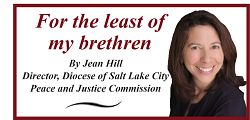God Calls Us to Help the Least of Our Brethren
It is distressingly easy to narrow the breadth of Catholic Social Teaching to achieve political goals. Being a Catholic in the world requires diligence, patience and regular, intentional return to our core teaching to ensure that the positions we take and the efforts we support are consistent with our professions of faith.
The core of Catholic Social Teaching is the dignity and sanctity of human life. Unfortunately, that short statement is far too often simplified to defend particular lives only. But “human life” means every life, from the child in the womb to the immigrant at the border, from the person experiencing homelessness to the death row inmate. It means we care about the fate of the pregnant mom living in poverty as well as the thousands of people in India dying from COVID-19, and those living in the small African village suffering from the devastating impacts of climate change.
It also means we defend the lives of those who may seem less deserving or less sympathetic than a cute, innocent baby. In our faith, the hardened criminal’s life is equally as sacred because even the person who has taken a life is created in the image and likeness of God. Even if he or she chooses to bury that image, we maintain that the opportunity to reconcile with Christ should never be denied.
Our church also teaches that the dignity of life matters as much as its sanctity. We are not a church that sits back while people suffer, waiting to join in defending their life only when it is in dire jeopardy.
For example, defending the dignity of every person means we are not afraid to look at our history and address the lasting impacts of decades of policy decisions based on a view of some races as less than human. Admitting that millions of American still suffer from past use of science and the Bible to justify the enslavement of Black men, women and children is to admit that the dignity of life for millions is impacted by the creation of judicial, educational, economic, political and other systems initially designed to uphold a faulty view of white people as superior. In our faith, no person is worth more than any other. No person is more deserving of being able to access food, clothing, shelter, education, health care or employment than another.
Catholic Social Teaching is our guide for all political, social and economic matters. What do we believe? First, that there is one God who created the entire human family. When one member of the family is suffering, we all suffer. When any member is denied basic human rights and dignity, we as a family must stand in solidarity to create the conditions that member needs to flourish as a human being.
Second, we believe that God created the family with all of its diversity. As we acknowledged at Pentecost, the Holy Spirit did not come to the divergent peoples of Earth and demand that each listen in the same language. The Holy Spirit spoke to “each in their own language” without segregating the cultures or excluding any member of the family. Our “catholic” church is universal, and thus celebrates all cultures, colors and languages.
Third, we believe we are responsible for one another. We are in solidarity as human beings, each with equal claim to life and to those things that make a life of dignity possible.
Which leads to our fourth belief, that the poor and marginalized are the top priority for us as believers and as a matter of public concern for governments and the governed. As Saint Pope John Paul II said in 1979, “You must never be content to leave them [the poor] just the crumbs of the feast. You must take of your substance, and not just of your abundance, in order to help them. And you must treat them like guests at your family table.”
Finally, we believe in our call to build God’s kingdom on Earth. Doing so requires that we remain open to helping the poor, oppressed or suffering experience God’s love in the here and now, not because we think they deserve it, but because God does.
Jean Hill is director of the Diocese of Salt Lake City Office of Life, Justice and Peace. Contact her at jean.hill@dioslc.org.
© Copyright 2024 The Diocese of Salt Lake City. All rights reserved.


Stay Connected With Us